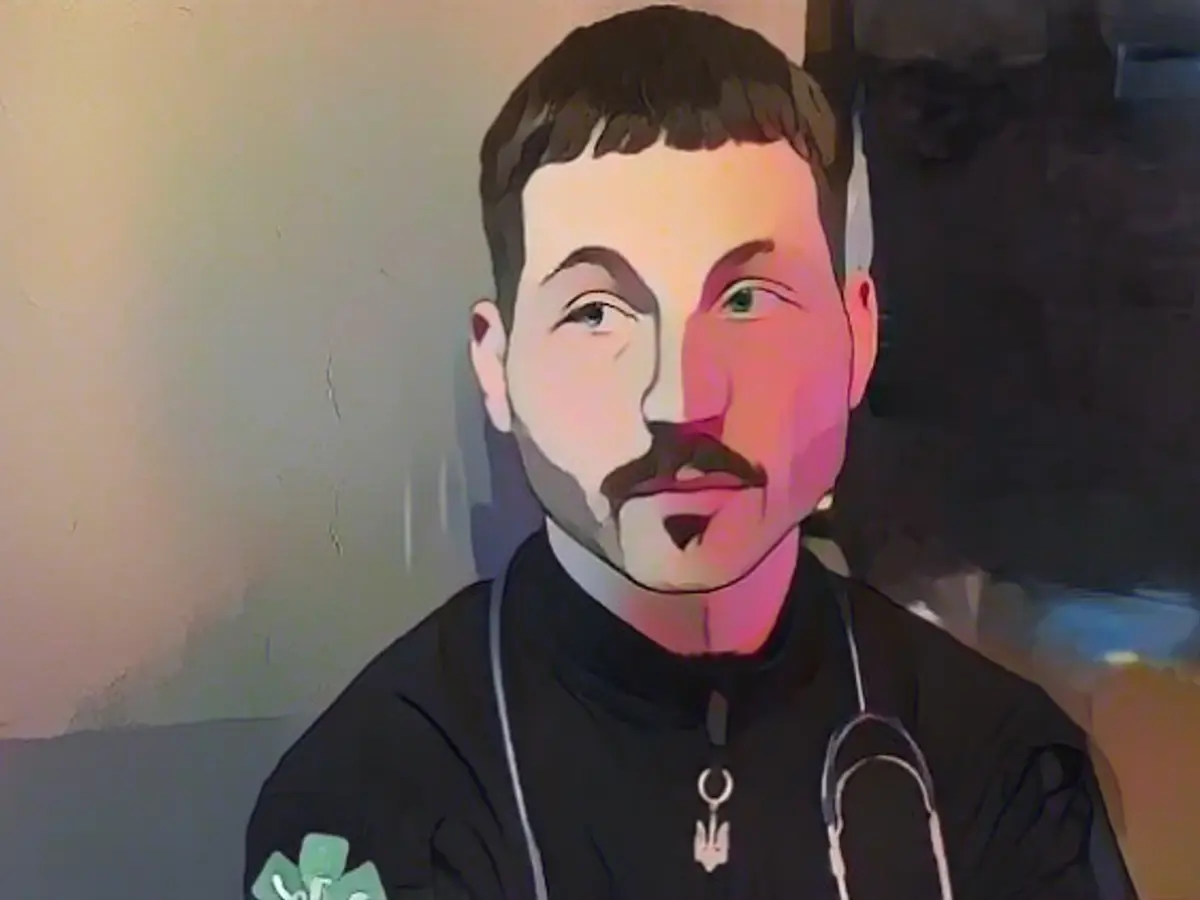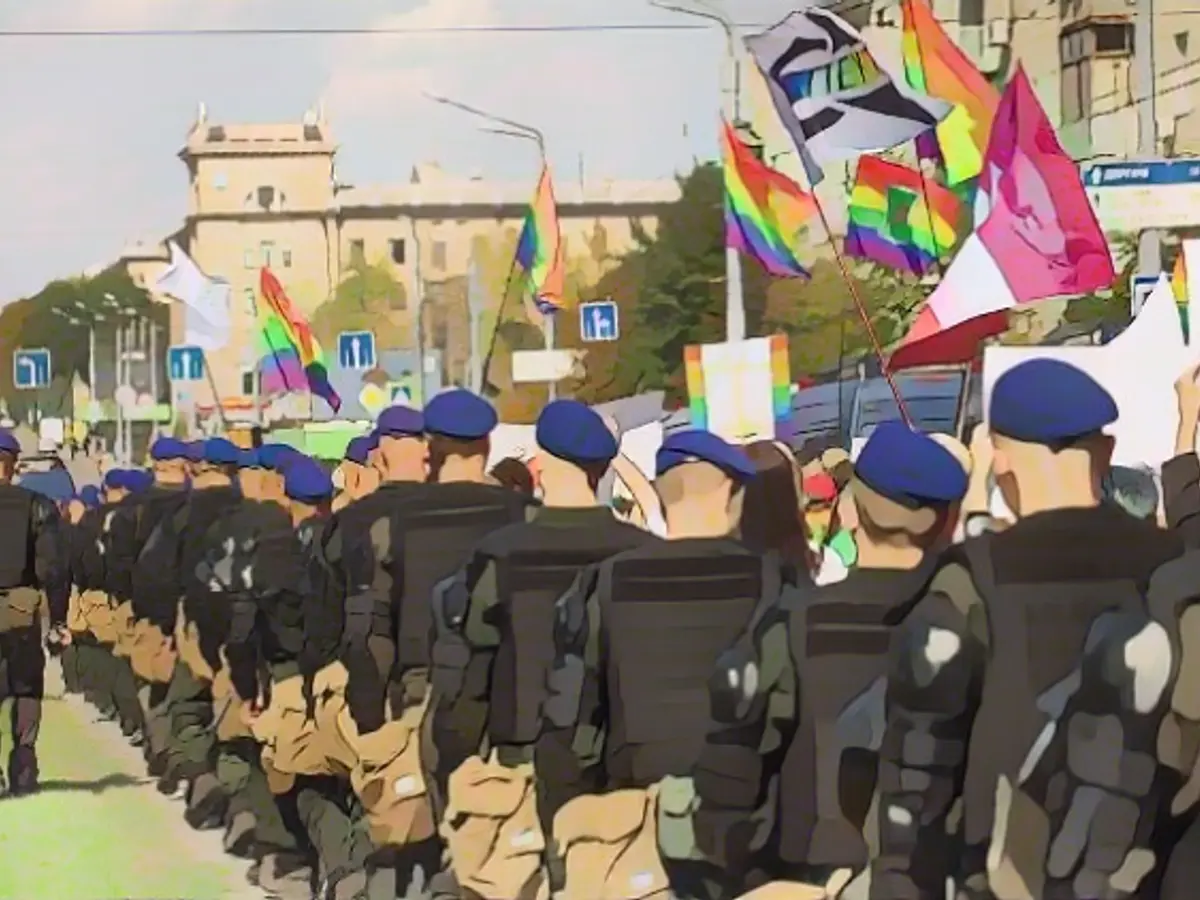"Unfortunately, Ukraine has only become more tolerant as a result of the war"
The Russian invasion is changing Ukrainian society. Lesbians, gays and queer people have the feeling that the country is becoming more open. However, it is a slow process. Discrimination still exists - even in the army.
Petro was fed up with the secrecy. Recently, on November 16, he came out. Petro is 22, he comes from the Ukrainian port city of Odessa and no longer wants to hide. Not even in the army.
On February 24, 2022, when Russia invaded Ukraine, Petro decided to join the Ukrainian army and defend his family. When his mother found out about his intention, she locked him in the house, but he climbed out of the second floor and went to the conscription office. As he was a confectioner, the army hired him as a cook. This service was also dangerous: "The first night we were bombed, I got scared and thought: Why did I even dare to do this? I didn't even know how to hold a rifle."

Petro stayed in the army anyway. He trained as a combat medic - first in theory, then in practice: under the supervision of a surgeon, he stitched a small cut on his own leg that he had previously inflicted on himself. "It was scary, but anything can happen in war and you have to be prepared for it," says Petro.
For Petro, however, it wasn't just the fear of wounds and bombing: He was under constant stress because of his sexual orientation. He was bullied, ostracized and discriminated against - so much so that he suffered acute stress reactions.
"There is still harassment in the army"
Many LGBTIQ people in Ukraine remain in hiding due to homophobia, transphobia, discrimination and fear for their careers. In a European ranking with regard to the rights of LGBTIQ people, Ukraine is only in 39th place, between Liechtenstein and Bulgaria. The situation in the army is no better, even though the Ukrainian LGBTIQ Military Association for Equality has been in existence since 2018. "There are between two and seven percent LGBT representatives in the Ukrainian armed forces. In total, there are about 400 military personnel in our association, and about 70 of them are open," says Maksym Potapovych, communications manager of the NGO.
Surveys show that 44 percent of Ukrainians have a neutral attitude towards LGBTIQ people in the army. Military doctor Petro Zlotia therefore believes that there has been progress in the acceptance and understanding of LGBTIQ people in the armed forces, albeit at a low level. "But there is still harassment in the army, if someone has a higher rank they feel like kings, ordinary soldiers are not listened to, especially if you are different," Petro said. According to the NGO LGBTIQ Military, attitudes towards soldiers from the community have improved in Ukrainian society - but in the Ukrainian armed forces, everything depends on the policies of the commanders.
Petro is still in the army. He normally works as a trainer for combat medics, but is currently undergoing psychotherapeutic treatment in a hospital as a result of his acute stress reactions. In August, he noticed spots on his body that he initially paid no attention to. This in itself was a sign of his illness, as he later learned. After a short leave in October, he received the surprising news that he was being transferred to another unit. "I think one of the reasons was that I'm an LGBT person. Someone in the brigade told me that the commander didn't want people like me in the battalion. Although I like where I am now much better, it was unpleasant."
Fed up with homophobic jokes
Petro deliberately timed his coming out on November 16, the International Day for Tolerance. "I didn't want to make a big deal out of it, but I wanted to be honest with myself and I want people to react to it normally. I've had enough of all these homophobic jokes from people who have two university degrees." At the same time, Petro had expected more hate. In fact, there were only a few negative comments on his coming out on social media. In his opinion, the fact that he received mostly friendly reactions despite everything has to do with the Russian invasion. "Unfortunately, our people have only become more tolerant as a result of the war," says Petro. "People have realized that we are united by a common goal and that gays and lesbians also fight on the front line and perform their duties no worse than other military personnel. We are very good professionals, but we are still bullied when people find out about our sexual orientation."
A key problem for LGBTIQ military personnel is that they are not allowed to marry their partners. This is an important issue for soldiers: in the event of death, partners do not even have the right to identify and release the body. But Petro's impression that the war is making progress here is probably correct: according to a survey by the sociological group "Rating", 42 percent of Ukrainians support the idea of granting the partners of LGBTIQ soldiers the same rights that the law provides for all military personnel and their families.
"Aren't you afraid of getting punched in the nose?"
Nevertheless, Petro is not an isolated case with his experiences of bullying and discrimination. Maria Volya from Mariupol has been serving in the Ukrainian armed forces since 2015. The 30-year-old non-commissioned officer is one of 43,000 women who have served in the Ukrainian army since the start of the major Russian war of aggression. She is also currently in a psychiatric clinic, being treated for post-traumatic stress disorder and severe depression because she was not understood by those around her. She has been openly homosexual for years.
For many of her male comrades, it is difficult enough to accept a woman in the army, she says: Most soldiers would think that women are primarily a burden. She herself, on the other hand, realized after the war began that some of the men who had been drafted were not as resilient as she was. "I'm fed up of having to prove that I can do all the tasks just as well as the men. And that you're still considered weak," says the female soldier.
Sometime after the Ukrainian army withdrew from Mariupol, Maria told her comrades that she had a girlfriend. At first, they thought it was just a story to protect themselves from unwanted advances, says Maria. After posting an open statement on Instagram, she received a call from her superior that same evening: "My commander shouted at me to delete the post or the information that I was a member of the brigade so as not to put them in an embarrassing situation." A psychologist later said to her: "Aren't you afraid of getting punched in the face?"
In the meantime, Maria has received a marriage proposal from her girlfriend and they dream of getting married in Denmark, as this is not possible in Ukraine. "I'm not very optimistic that same-sex marriage will be legalized here soon. We have already signed petitions , sent appeals to politicians and done what we could. Some people say there are no or very few LGBT people in the army. But coming out in public is really very risky, we are still being harassed."
At the same time, Maria is convinced that it is necessary to come out publicly in order to become stronger and more visible. Because otherwise, she is certain, nothing will change.
Read also:
- Year of climate records: extreme is the new normal
- Precautionary arrests show Islamist terror threat
- UN vote urges Israel to ceasefire
- SPD rules out budget resolution before the end of the year
The Russian invasion has led some LGBTIQ individuals in Ukraine to feel that the country is becoming more open, despite ongoing discrimination, even in the army. This is demonstrated by Petro, who came out as gay and joined the Ukrainian army during the invasion, facing bullying and discrimination but deciding to stay.
Despite the Ukrainian LGBTIQ Military Association for Equality existing since 2018, LGBTQ individuals in Ukraine's army continue to face discrimination and harassment, as evidenced by the experiences of Petro and Maria. The Ukrainian society as a whole ranks 39th in Europe in terms of LGBTIQ rights, making progress slow but detectable, according to military doctor Petro Zlotia.
Source: www.ntv.de








